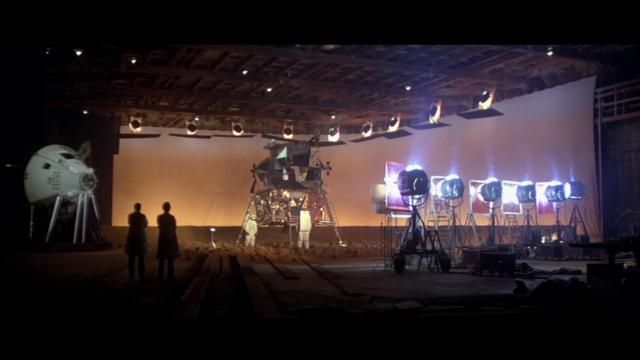“All systems are go, all lights are green.”
Last week’s Marathon Man may be the better movie, but Peter Hyams’ Capricorn One is much more iconic among the paranoid thrillers of the 1970s; only The Parallax View places higher. Hyams was never more than a serviceable filmmaker; he succeeds here because, like Parallax, he straight-on films one of America’s continuing under- and occasionally overground fantasies: the moon landing was faked–and although Hyams transposes the event to a Mars landing, he keeps all the iconography of the Apollo missions. (He wrote the screenplay in 1969 in the wake of Apollo.)
How Hyams subverts that iconography at every turn is the most powerful aspect of Capricorn One. The vista of Mars is a soundstage, the jump of the astronaut to the surface is a slow-motion effect, the NASA control room is identical to the TV control room broadcasting the hoax, both featuring ranks of white men in shirtsleeves and ties. That the three astronauts (Thanos’ Dad, Jack McCoy, Double Murderer) are All-American Family Men is necessary to get them to tell the lie, and get everyone to believe it; and Hyams intercuts their story with the Everyday Americans watching every step of the mission, not knowing that the watching is its real and only purpose.
Past that, Capricorn One is an uneven ride; the plotting is fairly tight (the first half tracks the mission through nine months, the paranoia growing; after a startling twist, the second half of the film takes place across two or three days) but full of holes (starting with a title that says JANUARY 4 and a voiceover that indicates Daylight Savings Time) and characters that don’t really have much purpose except that a studio movie in the 70s had to have them. Brenda Vaccaro does wonders with one of these characters–she usually does, and it’s a loss to all of us that she hasn’t become a star based on them. David Doyle gets another such character, and he turns in a performance that resembles no one so much as Airplane!‘s Johnny, one year later. Elliott Gould gets the lead role (Dogged Reporter on the Trail) and sleepwalks it, but to be fair, Gould sleepwalking is more interesting than 90% of actors going all out. (Telly Savalas shows up too, for some reason.) There’s also a great, nervous orchestral score from Jerry Goldsmith, and a well-plotted and horribly filmed final scene.
Hyams conveys well the paranoid sense that your entire reality can flip in a moment–a friend can disappear and never have existed, one moment everything depends on you and the next you’re expendable–all at the mercy of faceless powers so much bigger than you. (He also may have introduced unmarked black helicopters to pop culture as conspiracy icons.) The closest thing to a face on those powers and the best performance in the film comes from Hal Holbrook as the master conspirator, as smart and knowing as Deep Throat but this time never in anything but command. He delivers one of the great Villain Monologues in all cinema, shifting from sentimental to angry to idealistic to flat-out homicidal without ever once changing his tone. I never saw his Mark Twain, and I wonder how much of this performance–the man with all the secrets–would inform that one.
Capricorn One streams free on Amazon Prime.


